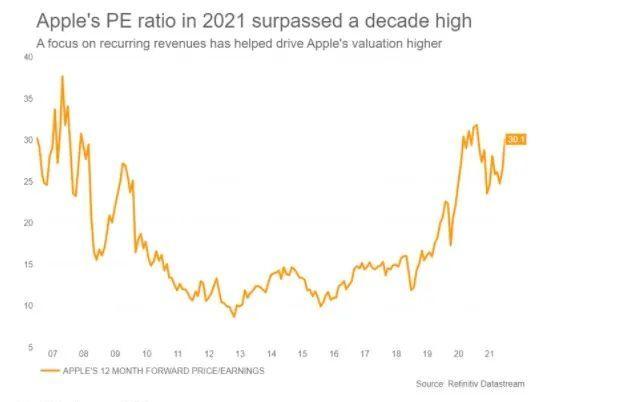(The full text is about 1500 words, and it takes 5 minutes to read)
Apple (AAPL. US) became the world's first company with a market capitalization of $2 trillion 16 months ago, and Apple's market value reached $3 trillion yesterday, and investors who are bullish or bearish on Apple's stock price are currently discussing the most: What does Apple take to support the $3 trillion market value?
The answer depends on how people perceive the iPhone maker's ability to sustain unprecedented growth over the past 15 years. In the fiscal year ended Sept. 25, Apple achieved 33% revenue growth to $365.8 billion due to strong demand for 5G iPhone upgrades.
But it's also worth noting that apple sales in fiscal 2019 have slipped significantly after a year of single-digit sales growth.
Bullish view
The bullish View of Apple is that Apple has built a strong ecosystem of 1 billion iPhone users who are willing to spend money on a variety of services, and that the company is in a very strong position to be in the field of future-oriented products such as autonomous driving technology and AR.
As Apple has proven the diversification of the company's new products, adding new devices including the Apple Watch and Apple AirTags, as well as new paid services such as TVs and fitness classes, most Apple investors believe that the pessimism of a sharp decline in Apple's stock price due to its excessive reliance on iPhone sales growth has largely disappeared.
Trip Miller, managing partner at Gullane Capital Partners, said: "Backed by its core product and growing portfolio of services, Apple told an incredible story of performance growth years ago and to this day. Apple was a favorite of value investors a few years ago, but I don't think the current near-record highs should be a signal for long-term investors to 'sell' operations. ”
In addition, according to Refinitiv's statistics, Apple's current price-to-earnings ratio (PE) is about 30 times, slightly lower than the 32 times in early 2021, but still at a high point since 2008. Hal Eddins, chief economist at Apple shareholder Capital Investment Counsel, said Apple has been a "safety stock" during the COVID-19 pandemic and that investors may expect holiday sales to be very strong.

"Apple seems to be immune to any threat posed by the Aomi Kerong mutation virus." Eddins said. "I'm not proud of the current price level, but there will certainly be some unforeseen pessimism that breaks the uptrend, but Apple is completely immune."
Some analysts believe that with the launch of future products such as Apple's self-developed self-driving cars (Apple Car), Apple's stock price still has a lot of room to rise in the next few years.
"We see the outlook for Apple Cars – a clear path that represents a doubling of Apple's revenue and market capitalization – prompting investors to focus primarily on the platform's attractiveness (reaching 1 billion loyal customers) and long-term, sustainable performance growth." Morgan Stanley analyst Katy L. Huberty wrote in November.
Bearish view
The reason for the bearishness on Apple, though, is that its user base growth and the amount of cash it gets from each user has reached its limits, and it can't guarantee that future product categories will be as lucrative as the iPhone.
Bernstein analyst Toni Sacconaghi warned in a report to investors last December that Apple's prospects for AR and VR are very bright, but by 2030, these two areas may only account for 4% of Apple's total revenue. In addition, he wrote, the overall market for these devices is unlikely to approach the 1 billion unit mark by 2040.
Sacconaghi also believes that Sacconaghi's stock price has rated Apple's stock price as "flat with the broader market" given the expected slowdown in growth in the next fiscal year.
Another big concern in the market is whether Apple's paid services based on hardware in the future will be able to make the same profits, and there is uncertainty about this profit. The company's App Store business model, which collects commissions from in-app purchases of digital goods, has become a regulatory target for proposed legislation in the U.S. and Europe.
Apple - cash "big bull"
To be sure, one of the main drivers of Apple's valuation climb was the goal the company set in 2018 to be able to secure nearly $100 billion in net cash from its balance sheet and achieve net cash neutrality. It is important to note that the underlying basis for achieving this goal remains performance.
Apple has never set a deadline for this tough goal, but it is undeniable that Apple has been obtaining net cash through high-quality performance and operations. Apple generated about $104 billion in cash from operating activities in fiscal 2021 and returned $106.5 billion to shareholders. But at the end of the fiscal year, its net cash remained at about $66 billion.
Tom Plumb, founder of Wisconsin Capital Management and apple shareholder, said that under the current strong supervision of antitrust regulators in the United States, large-scale acquisitions are basically impossible, so Apple has no choice but to return a large amount of cash to shareholders.
"They're fighting the fact that they have $100 billion in cash flow a year," Plumb said. "It's hard to go short for a company with cash flow of this scale."